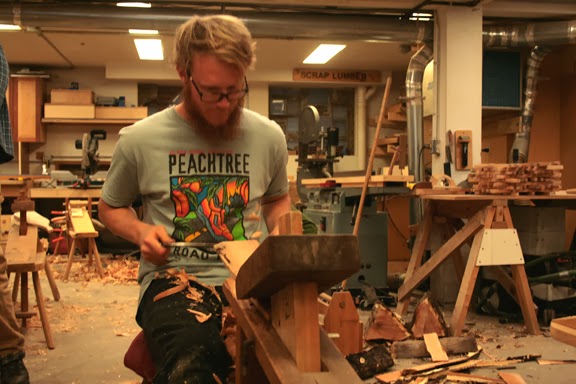Sitting down in the Yestermorrow South Studio to design a very elaborate pencil box,
Woodworking Certificate student Drew Chambers reflects on the program, now in its fourth week.
“Wood is something we all know with our eyes closed. But understanding how it grows, how it’s milled, and how it wants to behave are all integral to making wooden objects that will last.”

In these preliminary weeks of the eleven-week program, the class has already gone into the forest to analyze trees and the wood they produce, and studied the process of felling and skidding trees, and milling it into lumber. In the shop, green logs have been turned into ladderback chairs, and students have been introduced to the technical details of cabinetry and the art of joinery. Some students came into the program with significant experience, while others did not, yet every one of the chairs they produced looks uniformly elegant and reminiscent of one you might find in a refined antique shop. They have even built beautiful wooden mallets which they will take with them as they embark on their woodworking careers. And this week, a diverse range of boxes are being designed and crafted, from the smaller project like Drew’s, to a large toolbox.
Drew first heard about Yestermorrow when a bus showed up at the Slide Ranch in northern California where he was working as a farm-based environmental educator. This bus had been retrofitted complete with a rainwater catchment system, a greenhouse, a biodiesel engine, and solar panels on the roof. Drew wanted to know how he did it. As it turns out, this man had completed the Certificate in Sustainable Design program at Yestermorrow, and that was when Yestermorrow entered Drew’s life path.
After receiving an art degree from Carleton College in Minnesota, Drew had spent his post-collegiate years teaching environmental science and was inspired by the sustainable infrastructure of the farms and schools in which he worked. “After that I wanted to get some experience with construction, design and woodworking, so that’s what brought me to the Woodworking Certificate program,” Drew explains.
“This is a way I can revive my art career by being a craftsman.” As an educator, Drew has a strong drive to help people be self-sufficient, and “woodworking is one critical skill people need to know about.” No matter where his career takes him, Drew knows that he will be able to use his woodworking skills to sustain or supplement his living.
With an impassioned voice, Drew shares his revelations from these early stages of the program, “Whether it’s a log, or a board or a chair, wood is always trying to tell you where it came from. It gets us back in touch.”
By Nic Tuf